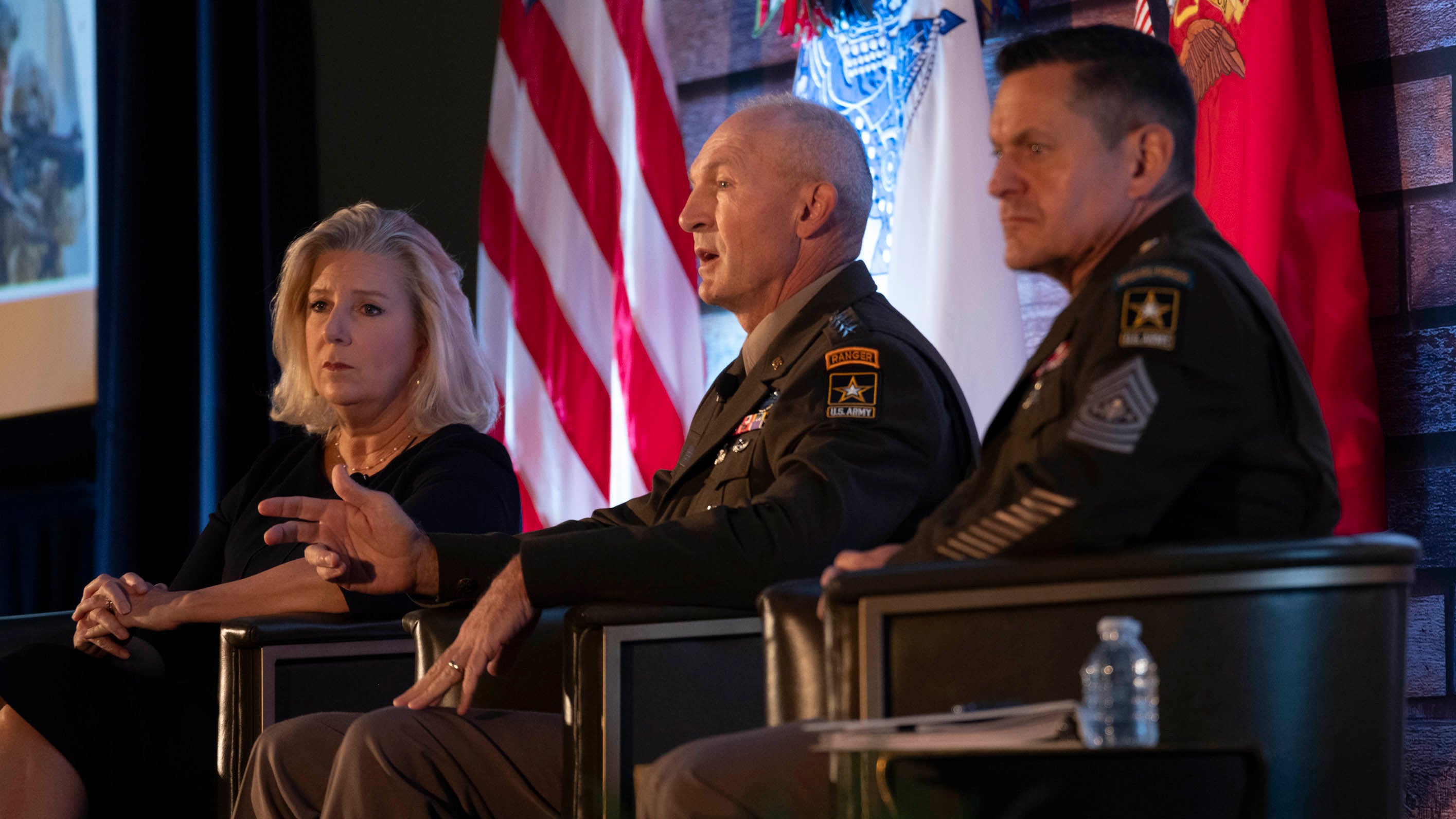Army Leaders Discuss Family Concerns, Challenges
Army Leaders Discuss Family Concerns, Challenges

In a town hall for family members featuring the Army’s top leaders, one soldier stood and stated his problem bluntly. His wife, he said, “would rather deal with Comcast than try to find information from the Army.”
Army Secretary Christine Wormuth visibly reeled from the rebuke, but then turned to the service’s new chief of staff, Gen. Randy George.
“We have soldiers working on this right now, and they have interviewed hundreds of spouses, soldiers at all different levels so that you get the same kind of user experience,” George said.
George’s solution to the Army’s long-standing failure to push out accurate and timely information about installations, particularly online, is a new app called “My Army Post.” At the forum, held Oct. 11 at the Association of the U.S. Army’s 2023 Annual Meeting and Exposition in Washington, D.C., George asked a team of four Army software engineers to come to the front of the room. They had been tasked two weeks ago, he said, to develop the app, building in need-to-know information from gate hours to on-post services and medical and child care resources.
Thanks to input from stakeholders across the Army, George said, the app will be designed to be accessible to everyone who needs to get around an Army post.
George said at the forum’s outset that making sure families moving to new installations could easily get connected was a particular priority for him and a frustration he experienced as part of an Army family. “I'm looking around at all the people in uniform, and you know what it’s like to show up in a location and not necessarily know where to go, so you know how important welcoming is when you show up someplace, and being able to find the right resources,” he said.
This is not the first time the Army has launched a smartphone app aimed at putting post resources and information in a single place. In 2020, the service announced the new Digital Garrison app, developed through a collaboration between AAFES, Army Installation Management Command and Army Morale, Welfare and Recreation.
That app is still available, with a 4.3-star rating out of five on the Apple store. It was not, however, developed under the oversight of the chief of staff of the Army and by active-duty soldiers. George added that the app would create a tailored experience for users based on the information they need most. “These are nerds,” George said of the software team, “and that’s a compliment.”
George said the team had been given 30 days to present a working solution, but a version of the “My Army Post” app is already available to download from app stores.
Information flow problems go beyond gate hours and getting around post. As the Army leaders hailed policy improvements for spouse employment, including an agreement with the Italian government that will allow spouses stationed there to work remotely, George said not enough spouses seemed to be aware of the licensure reimbursements offered by the Army. Since 2019, he said, only about 800 spouses had taken advantage of the offer.
“We’ve got to do better at getting the information out,” he said.
Army leaders also are emphasizing better communication and creative solutions to well-known problems in other areas. For the first time in the family town hall series, leaders solicited real-time feedback via attendees’ smartphones on topics they cared about most. When the first question went live—what quality of life topics the audience wanted to hear leaders speak on—the response was nearly instantaneous: Barracks issues loomed above other issues in a growing word cloud.
Wormuth acknowledged a Government Accountability Office report published in late September that revealed persistent poor living conditions and hazards including sewage overflow and mold. She said the service would “take all of those recommendations on board,” as leaders work to increase spending for fiscal 2025 on military construction and barracks sustainment.
“I would ask you to be patient with us,” she said, as the Army works to improve oversight and accountability while constrained by a flat current budget.
She added that the Army is exploring the possibility of launching a privatized barracks project at Fort Irwin, California, following the lead of the Navy, which has two such projects in Norfolk, Virginia, and San Diego. “That would be a big shift, but it’s something we’re looking into, because it may work in some places,” Wormuth said.
A final smartphone question for the audience asked attendees what factors most affected decisions about whether to continue serving. Topping the list, in nearly a dead heat, were salary and operational tempo.
While demands on the Army continue to be high, George said he is in the process of reviewing current practices and requirements in hopes of clawing back time from unnecessary maintenance hours or training that could be better spent at home. “We have to learn to say no to certain things,” he said.
— Hope Hodge Seck for AUSA

